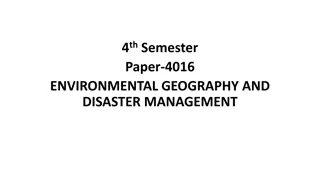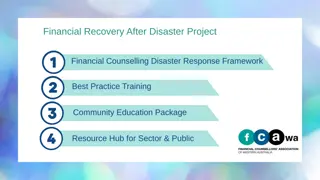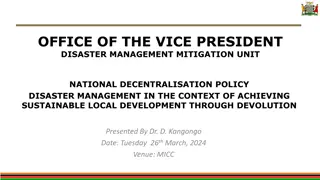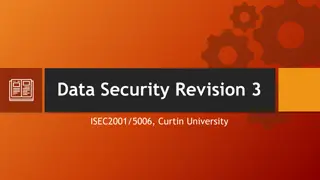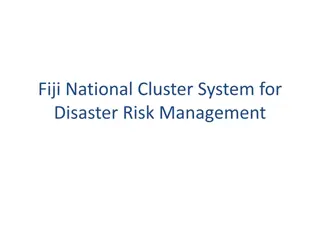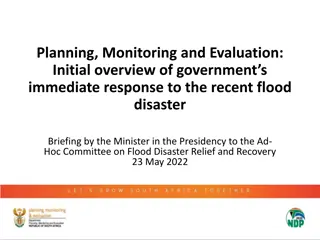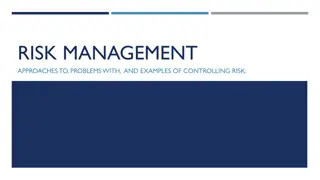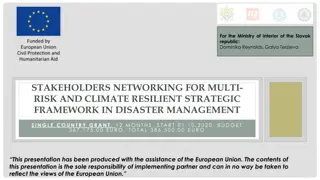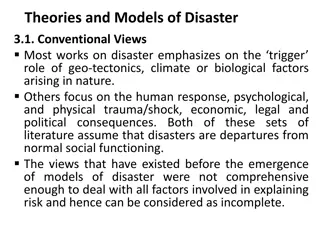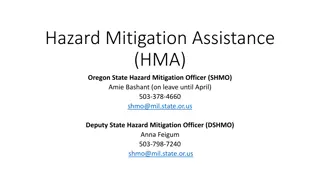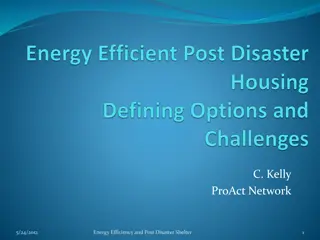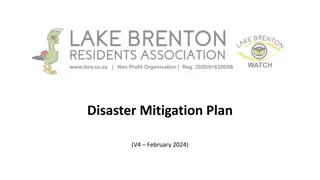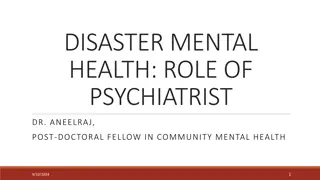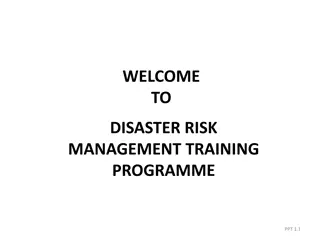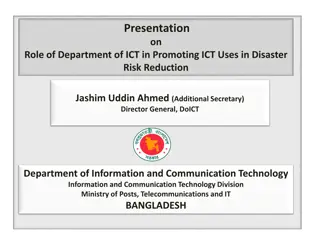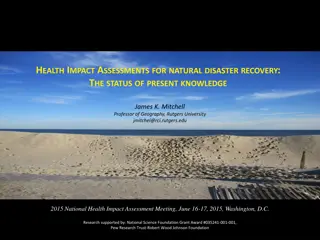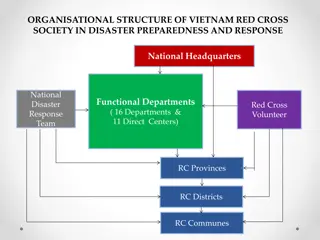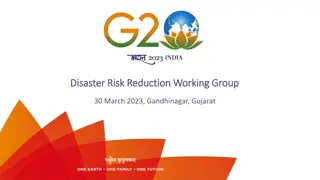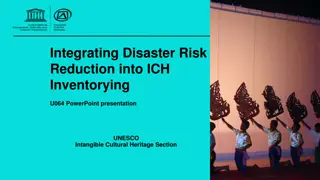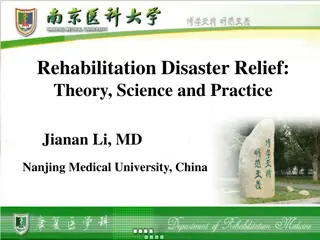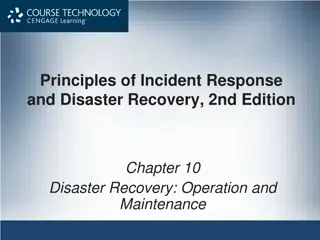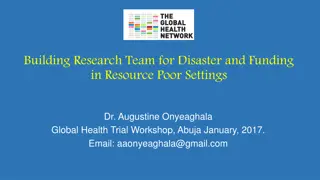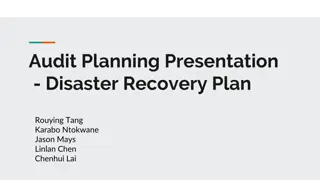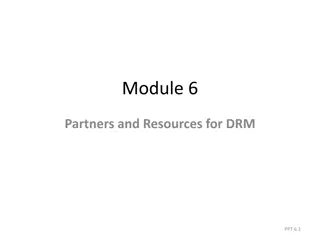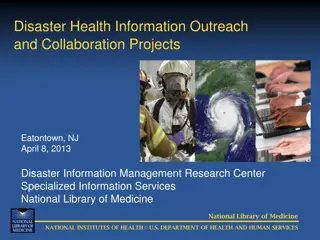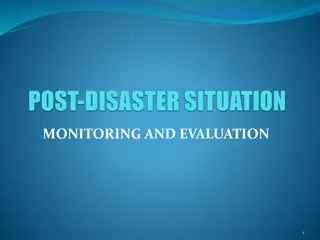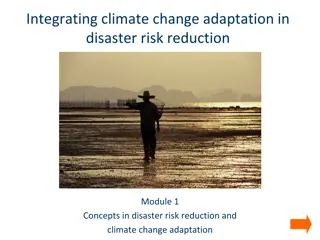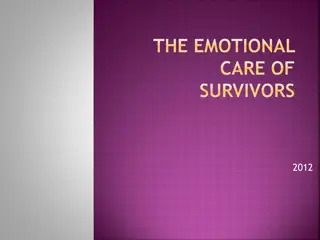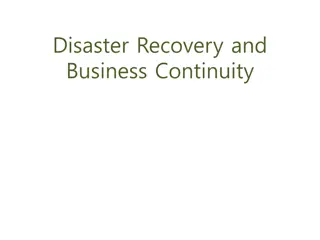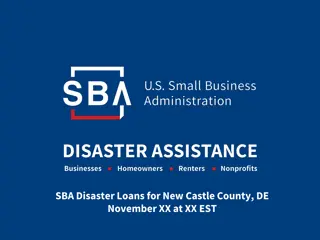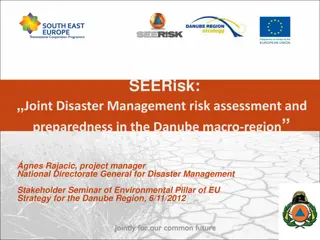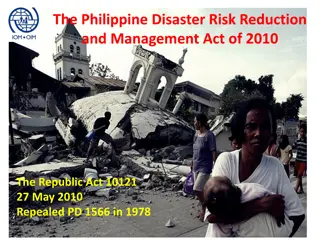International experience in the field of Disaster-related Statistics
Disaster-related statistics encompass data on disaster occurrences, impacts, risk assessment, and post-disaster assessments. The Sendai Framework for Disaster Risk Reduction and the 2030 Agenda for Sustainable Development set global targets and indicators for monitoring disaster risk reduction. Vari
7 views • 6 slides
Understanding Disaster Management Cycle and Phases
Disaster management encompasses planning, organizing, and implementing measures to prevent, reduce, and respond to disasters effectively. The disaster management cycle includes phases such as mitigation, preparedness, response, and recovery. The aim is to reduce potential losses, provide assistance
4 views • 15 slides
Disaster Management and Local Development Through Devolution
The presentation outlined the importance of disaster management in the context of achieving sustainable local development through devolution. It emphasized the need for effective subnational planning, mainstreaming of disaster risk reduction, and financing for disaster relief. The concept of devolut
5 views • 21 slides
Financial Recovery After Disaster Project: Comprehensive Framework for Community Resilience
This project focuses on financial recovery after disasters through financial counseling, disaster response frameworks, best practice training, and community education resources. It emphasizes understanding disaster risk governance, fostering individual responsibility, and identifying community champ
6 views • 5 slides
Disaster Management and Sustainable Local Development Through Devolution
The presentation explores the integration of disaster management into subnational planning for achieving sustainable local development through devolution. It emphasizes the importance of decentralization, mainstreaming disaster risk reduction, urban areas' resilience, and financing for disaster reli
3 views • 21 slides
Comprehensive Guide to Data Security, Business Continuity, Risk Management, and Disaster Recovery
Explore a detailed overview covering topics such as data security revision, business continuity planning, risk analysis, management strategies, incident prevention, response, recovery, change management, and disaster recovery. Learn about risk assessment, business impact analysis, continuity plans,
0 views • 9 slides
Universal Evaluation Framework: Simplifying Evaluation Processes
This session introduces the Universal Evaluation Framework (UEF) developed for evaluating QAA Scotland Enhancement Themes. Participants learn key evaluation questions, evidence capture, and the Theory of Change to enhance evaluation confidence. The QAA Scotland Evaluation Odyssey details historical
2 views • 14 slides
Strategic Communications for NASA Earth Applied Sciences Disasters Program
NASA's Earth Applied Sciences Disasters Program aims to enhance disaster prediction, preparedness, response, and recovery through Earth observations. The program utilizes strategic communications to raise awareness about disaster impacts and the importance of NASA's work. It emphasizes the role of h
1 views • 14 slides
Fiji National Cluster System for Disaster Risk Management
The Fiji National Cluster System for Disaster Risk Management emphasizes the importance of coordination in emergencies, aiming to reduce gaps and overlaps through a coherent, complementary approach. Global Cluster coordination systems have been adopted to enhance collaboration among various humanita
1 views • 22 slides
Disaster Resilience Strategy in Developing Countries Vulnerable to Natural Disasters
The IMF's policy paper highlights key challenges faced by small states in building resilience, such as under-investment and donor support post-disaster rather than pre-disaster. The Disaster Resilience Strategy (DRS) emphasizes three pillars for intervention: post-disaster resilience, financial resi
0 views • 11 slides
Government's Immediate Response to Recent Flood Disaster: Overview and Assessment
Understanding the background and context of the recent flood disaster in KwaZulu-Natal (KZN) and other affected areas, this briefing outlines the government's quick response, including the declaration of a national state of disaster, coordination efforts, and actions taken by various government bodi
1 views • 35 slides
Understanding Risk Management Approaches and Disaster Preparedness
Risk management is a systematic approach to identify, assess, and understand risks to guide management decisions. Perception influences risk management strategies, with varying perceptions between the public and experts. Proactive and reactive approaches help in managing risks effectively. Disaster
2 views • 13 slides
Stakeholders Networking for Multi-Risk and Climate Resilient Disaster Management in Slovakia
This project, funded by the European Union, aims to enhance emergency preparedness and response in Slovakia by addressing institutional capacity, coordination, and technology gaps. The goal is to strengthen risk assessment methodologies, involve various stakeholders, and develop disaster-resilient m
1 views • 5 slides
Understanding Theories and Models of Disaster
Works on disaster traditionally focus on natural triggers and human responses, but older views are considered incomplete. The Pressure-Release Model (PAR) explains vulnerability and risk reduction, highlighting underlying causes and unsafe conditions. Root causes such as economic, demographic, and p
0 views • 17 slides
Understanding Evaluation in Education
Evaluation in education is a comprehensive term that encompasses measurement, testing, and qualitative examination of student behavior. It involves both quantitative and qualitative descriptions, along with value judgments. Differentiating from mere measurement, evaluation provides a deeper analysis
0 views • 28 slides
Hazard Mitigation Assistance (HMA) Funding Eligibility and Priority
Entities within the declared disaster area have priority to apply for Hazard Mitigation Assistance (HMA) funding. Eligible applicants include those in Clackamas, Coos, Douglas, Jackson, Jefferson, Josephine, Klamath, Lake, Lane, Lincoln, Linn, Marion, Tillamook, Wasco, Washington, Yamhill Counties,
0 views • 21 slides
Energy Efficiency and Post-Disaster Shelter Innovations
Explore the concept of energy efficiency in post-disaster shelter solutions, focusing on methods such as using less energy, sustainable options, and innovative technologies like solar panels and biogas. The discussion also delves into challenges faced in implementing energy-efficient designs post-di
0 views • 8 slides
Lake Brenton Disaster Mitigation Plan Overview
The Lake Brenton Residents Association plays a crucial role in disaster response with defined responsibilities including being the first responder, securing the area, and coordinating with authorities. The Disaster Mitigation Plan for Lake Brenton outlines roles, organizational structure, procedures
1 views • 20 slides
Understanding the Role of Psychiatrists in Disaster Mental Health
Disaster mental health involves applying psychiatric skills to aid individuals and communities in recovering from the psychological effects of disasters. This includes readiness, response, relief, rehabilitation, recovery, and resilience phases. Mental health professionals play a crucial role in ide
0 views • 30 slides
Overview of Monitoring and Evaluation in the GEF
The Evaluation in the GEF and Training Module focuses on promoting accountability and learning within the Global Environment Facility (GEF) through monitoring and evaluation activities. The GEF Independent Evaluation Office plays a crucial role in assessing results, effectiveness, and performance of
0 views • 25 slides
Disaster Risk Management Training Programme Overview
This presentation provides an overview of a Disaster Risk Management (DRM) Training Programme, aiming to raise awareness about different types of disasters, their impacts, and the importance of having a DRM plan. It includes modules covering topics such as DRM framework, risk assessment, post-disast
0 views • 28 slides
Role of Department of ICT in Disaster Risk Reduction in Bangladesh
The Department of Information and Communication Technology (ICT) in Bangladesh plays a crucial role in promoting the use of ICT for disaster risk reduction. Bangladesh faces numerous catastrophic hazards, making it essential to utilize ICT for warning systems, relief management, and post-disaster ac
0 views • 16 slides
Health Impact Assessments for Natural Disaster Recovery
The study examines the status of knowledge related to health impact assessments for natural disaster recovery, emphasizing the importance of considering the long-term health impacts of disasters. It highlights how disasters and recovery actions can have lasting consequences on community health and w
0 views • 10 slides
Organisational Structure of Vietnam Red Cross Society in Disaster Preparedness and Response
The Vietnam Red Cross Society has a structured organizational setup for disaster preparedness and response, including the National Headquarters, Disaster Management Department, and various functional departments at different levels. The organization has achieved significant results in disaster manag
0 views • 6 slides
Global Initiatives for Disaster Risk Reduction in Gandhinagar
The Disaster Risk Reduction Working Group (DRRWG) in Gandhinagar, Gujarat, is focusing on priorities such as early warning systems, resilient infrastructure, financing, disaster response, and recovery. There is a strong emphasis on the connection between disaster risk reduction and sustainable devel
0 views • 18 slides
Integrating Disaster Risk Reduction into ICH Inventorying for UNESCO
Learn how to apply a community-based approach to inventorying and safeguarding intangible cultural heritage within the context of disasters. This presentation offers frameworks, tools, and exercises to integrate disaster awareness into ICH inventorying and safeguarding practices, emphasizing the imp
0 views • 15 slides
Rehabilitation Disaster Relief: Theory, Science, and Practice
Challenges in Rehabilitation Disaster Relief include lack of extensive rescue capacity, rehab resources and management, fund shortages, and uncoordinated implementation. ISPRM-RDRC outlines past and future actions focusing on the NHV model, mobile rehab teams, international rehab databases, rehab st
0 views • 21 slides
Disaster Recovery Operations and Maintenance Overview
Organizations face key challenges in disaster recovery operations, such as widespread disruptions affecting various levels, communities, and suppliers. Prompt reactions and preparedness are essential to navigate through the phases of a disaster recovery plan - preparation, response, recovery, resump
0 views • 48 slides
Building Research Team for Disaster and Funding in Resource-Poor Settings
Disaster research team building is essential for effective disaster management in resource-poor settings. Dr. Onyeaghala emphasized the importance of competent teams in mitigating, preventing, managing, and monitoring health disasters. The workshop in Abuja highlighted the critical competencies and
0 views • 24 slides
Evaluation of FME Zero Emission Neighbourhoods in Smart Cities
The mid-term evaluation process of FME Zero Emission Neighbourhoods in Smart Cities involves self-evaluation, partner evaluation, and panel evaluation. The procedure includes scientific review, evaluation by scholars, and innovation assessment. Key documents like self-reports, progress reports, and
1 views • 20 slides
Disaster Recovery Plan Audit for Berry College
Berry College's Information Technology Disaster Recovery Plan is a vital strategy to ensure the continuity of IT operations in the event of a disaster. This audit plan presentation outlines the objectives, scope, and responsibilities involved in auditing and maintaining the effectiveness of the disa
0 views • 20 slides
Partners and Resources for Disaster Risk Management (DRM)
In Module 6, trainees learn about local partners like police, home guards, and health centers who provide immediate assistance post-disaster. The module emphasizes the importance of incorporating various partners at local, national, regional, and international levels in a DRM plan to enhance respons
0 views • 13 slides
Disaster Health Information Outreach and Collaboration Projects: Enhancing Disaster Preparedness
This project by the National Library of Medicine aims to improve access to disaster medicine and public health information for the disaster health workforce through partnerships with various organizations across the United States. Seven projects are awarded annually, focusing on enhancing disaster p
0 views • 15 slides
Disaster Management and Evaluation in Nigeria
This presentation by the Director General of FCT Emergency Management Agency explores the overview of disaster situations in Nigeria, including causes, impact, and costs. It also delves into the management of disasters in Nigeria, addressing prevention, affected populations, and responsibilities. Th
0 views • 38 slides
Integrating Climate Change Adaptation in Disaster Risk Reduction Module 1
Welcome to the e-Learning module on integrating climate change adaptation in disaster risk reduction. This module covers concepts in disaster risk reduction and climate change adaptation. It is part of a package that includes five modules focusing on vulnerability, disaster risk reduction, climate c
0 views • 29 slides
Supporting Emotional Well-being in Disaster Survivors: Resources and Training
Explore resources from the Missouri Department of Mental Health for providing emotional care to disaster survivors. Learn about stress responses, training programs like Psychological First Aid, and access web resources for disaster readiness. Contact Jenny Wiley, Coordinator of Disaster Services, fo
0 views • 8 slides
Importance of Disaster Recovery and Business Continuity Planning
Disaster recovery and business continuity planning are crucial for businesses to survive major disasters and continue operations. This involves assessing business impacts, creating documentation, and planning for various types of disasters. Failure to plan can lead to significant revenue loss, damag
0 views • 46 slides
Understanding SBA Disaster Loans for New Castle County, DE
Explore the role of the Small Business Administration in disaster recovery through its loan programs for businesses, homeowners, and renters in New Castle County, DE. Learn about the types of SBA disaster declarations, loan programs offered, limits on loan amounts, and details of the recent New Jers
0 views • 20 slides
SEERisk: Disaster Management and Preparedness in the Danube Macro-Region
Joint Disaster Management project SEERisk aimed to assess and enhance preparedness in the Danube macro-region, involving multiple stakeholders in environmental disaster risk reduction. The project, led by gnes Rajacic, Project Manager at the National Directorate General for Disaster Management, focu
0 views • 17 slides
Enhancing Disaster Risk Reduction in the Philippines
The Philippine Disaster Risk Reduction and Management Act of 2010, also known as Republic Act 10121, replaced PD 1566 and introduced a proactive approach to disaster management, focusing on risk reduction and building community resilience. The new law aims to transform and reform disaster response b
0 views • 26 slides

